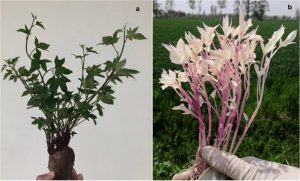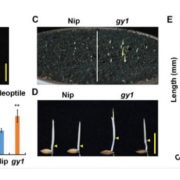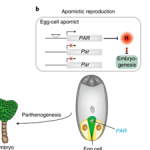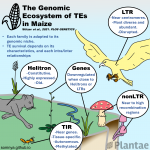Transcriptome sequencing of a novel albino mutant of hexaploid sweetpotato (Plant Mol Biol Rep)
 Albino plants lack chlorophyll, which means that they cannot photosynthesize. These kinds of plant are unique and can offer information as to the molecular mechanism of chlorophyll degradation and photosynthesis in plants. Here, Arisha et al. explored the differences in gene expression patterns of seedling leaf tissues from albino mutant sweetpotatoes (Ipomoea batatas) and their green counterparts, using RNA sequencing. In albino plants compared to the green plants, the authors discovered that 3000 unigenes involved in plant mobilization of stored carbohydrates and fats were highly expressed while 2418 unigenes involved in chloroplast development, biosynthesis and differentiation were downregulated. Similarly, genes involved in the metabolism of chlorophyll a, b and carotenoid pigments were downregulated in albino plants compared to the green plants. Through this study, the authors successfully interrogated the complex hexaploid sweetpotato genome and identified important gene regulatory networks. This work also provided insight into some complex biological process for photosynthesis in plants. (Summary by Modesta Abugu @modestannedi) Plant Mol. Biol. Rep. 10.1007/s11105-020-01239-6
Albino plants lack chlorophyll, which means that they cannot photosynthesize. These kinds of plant are unique and can offer information as to the molecular mechanism of chlorophyll degradation and photosynthesis in plants. Here, Arisha et al. explored the differences in gene expression patterns of seedling leaf tissues from albino mutant sweetpotatoes (Ipomoea batatas) and their green counterparts, using RNA sequencing. In albino plants compared to the green plants, the authors discovered that 3000 unigenes involved in plant mobilization of stored carbohydrates and fats were highly expressed while 2418 unigenes involved in chloroplast development, biosynthesis and differentiation were downregulated. Similarly, genes involved in the metabolism of chlorophyll a, b and carotenoid pigments were downregulated in albino plants compared to the green plants. Through this study, the authors successfully interrogated the complex hexaploid sweetpotato genome and identified important gene regulatory networks. This work also provided insight into some complex biological process for photosynthesis in plants. (Summary by Modesta Abugu @modestannedi) Plant Mol. Biol. Rep. 10.1007/s11105-020-01239-6









